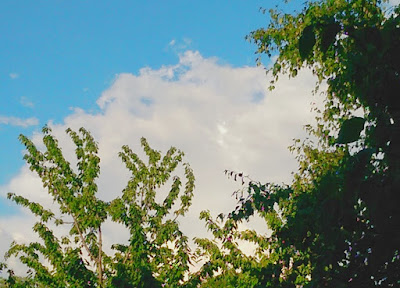A few days ago I had a strangely mystical experience while snacking on my back deck. It was a lovely summer evening and I was going out in an hour to meet friends for drinks, but I thought I should eat a bit before I went out so I pulled a box of crackers from the cupboard and found some cream cheese in the fridge. That seemed like a boring combination on its own so I delved further into the fridge and found an open jar of jam. It was quince marmalade that my dad made. It was the last jar I had. I'd opened it several months ago, and I'd been using it up slowly ever since. It seemed like it would go well with the cream cheese, so I took my snack ingredients out to the back deck and started assembling cheese and crackers and jam.
I should say at this point that months I've been feeling distant from my Dad's memory. My friend B who was close to my dad says sometimes when he's feeling sad or confused he wonders what my Dad would say, and then he feels a warm glow like my Dad's really there, and then he knows what to do. I know B's trying to comfort me when he says that - as if to say my Dad's not really gone - but it actually makes me feel sadder because I never feel my Dad's presence the way B does. I just feel like he's gone.
I thought about that while I sat eating on the deck, and I also thought about a Fringe Festival show I went to a few weeks ago. It was a one-woman show by the wife of a guy in my writing group - it was called "What! You're a Medium?" and in it my friend's wife told us the story of how she'd come to feel connected to the spirit world (it started when she was eight) and how she'd grown up to become a professional medium giving people messages from beyond the grave. She asked people in the audience if they had photos of dead loved ones they wanted to hear from and several people held up their hands. She did about a dozen "readings" saying things like - "This is your mom? She worries that you work too hard," and "This is your wife? She's happy you've found a new girlfriend. She likes her." Everyone who had a reading done looked very moved.
As I sat on the back deck eating my dad's jam I was aware of feeling disconnected from my dad, and it occurred to me that where B and the medium were choosing to connect I was actively choosing not to even try to. When I feel sad and confused I never wonder what my dad would advise. And at the Fringe show I could have given the medium a photo of my dad but I'd decided not to. I'd felt sure that even if she conveyed a "message" from him I wouldn't have believed it and that would have made me feel even more alone.
After I'd thought about that for a while and gone through about a twenty crackers with cheese and spoonfuls of jam on them, I wondered what it would be like if I made a different choice. How would it feel if I actually tried to reach out?
I breathed in, breathed out. I thought of the last time my dad sat on my deck, how he'd closed his eyes and almost fallen asleep. I imagined his spirit out in the universe, watching me now as I ate the last of his jam.
Then, as I was scraping the very last bits from the bottom of the jar I heard a clap of thunder. I looked up to see that where blue sky had been just moments earlier there was now a small thundercloud. Gentle rain began to patter. Then a rainbow appeared. The rain never got hard. The cloud passed quickly. And ten minutes later it was over.
In life my dad was always quiet man, never one to roar and shout. But that thunderclap did remind me of him at the hospital in a moment just before he died. He was unconscious by then and after several hours of strange, increasingly intense breathing he let out a long moan. It went on forever, as if his lungs were emptying out every molecule of oxygen. It was probably some automatic thing his body did, some convulsion as his organs failed, but what it felt like was the moment he stopped fighting death. It felt like the moan was his spirit yelling "Okay, here I come!" He died a few minutes later.
I don't really believe that me scraping out the bottom of a jam jar caused that freakish isolated thunderstorm. Or that the thunder was my dad yelling, "I'm still here. Don't forget me!" Or that the rainbow was his way of reminding me that life is beautiful. Or that the gentle rain was his blessing.








































